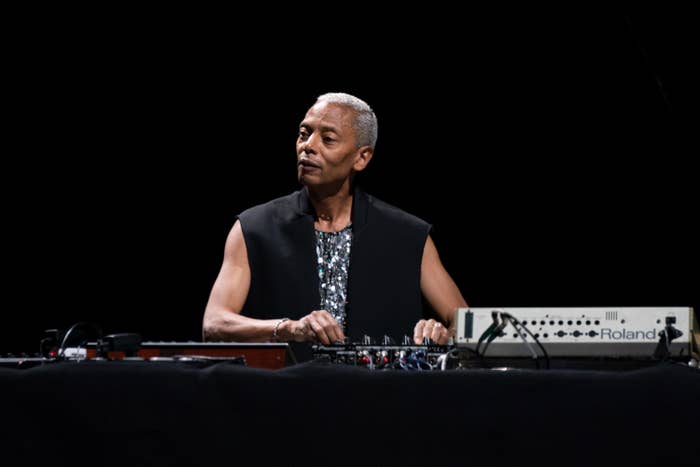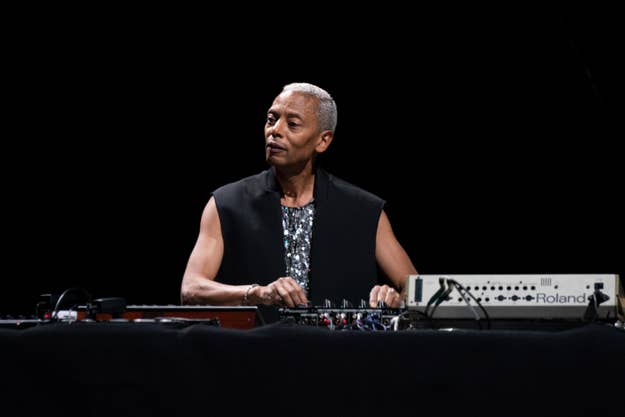
Jeff Mills is known to generations of ravers for the techno anthem "The Bells." But the Detroit DJ/producer is a cultural auteur—his '90s minimal explorations widely emulated in the techno scene, even as he's expanded into visual art, film and fashion. Indeed, in 2024, this futurist is redefining the avant-garde. Significantly, Mills' career has been reappraised amid the Black Lives Matter movement, with commentators observing how today's EDM is dominated by white male stalwarts.
Mills, who played drums in childhood, started as a turntablist called The Wizard in the Motor City—his '80s mythology in the historically Black industrial city so enduring that Eminem paid homage to him in 2013's "Groundhog Day," rapping, "If you ain't listened to The Wizard, you ain't have a fuckin' clue what you was missing."
Curious about electronic music, including European synth-pop, Mills initiated an industrial group, Final Cut, before founding the techno collective Underground Resistance (UR) with Mike Banks. In the '90s Mills went solo—becoming renowned in cities like Berlin as a DJ, harnessing three decks and Roland TR-909 drum machine to advance an exhilaratingly frenetic mix style.
Post-UR, Mills determined to stay independent, establishing Axis Records in 1992. He and another UR alumni, Robert Hood, would introduce a new minimal techno—influencing disparate electronic producers, among them James Blake.
Mid-decade, Mills aired a landmark mix, Live At The Liquid Room—Tokyo, opening with his cinematic opus “Utopia” but also entailing a prototype of “The Bells.” Alas, it's not on streaming platforms.
In the 2000s Mills' output became ever more conceptual—the longtime science fiction buff contemplating the nexus between human and machine, time, space, futurism and possibility. Now a multidisciplinary artist, he's ventured into film (twice scoring Fritz Lang's 1927 sci-fi silent classic Metropolis, over two decades) and joined orchestras (in 2005 recording "Blue Potential" with the Montpellier Philharmonic Orchestra).
Lately, Jeff Mills has been especially visible in fashion. He stunned techno fans with a dual drum machine performance at Virgil Abloh's final Off-White collection, Spaceship Earth: An Imaginary Experience, during Paris Fashion Week in 2022 (attending were Rihanna and A$AP Rocky with Chicago house DJ and model Honey Dijon).
Then Mills was the face of Jil Sander's Fall/Winter 2023 campaign, the German luxury fashion house aptly associated with minimalist aesthetics.
And the prolific Mills has newly embraced collaboration—and live performance, again deploying his 909 as an instrument.
In 2018 Mills launched the improv jazz ensemble Tomorrow Comes The Harvest alongside Nigerian drummer Tony Allen—the Afrobeat pioneer previously working with Fela Kuti and Damon Albarn—and French keyboardist Jean-Phi Dary, inspired by Afrofuturism and Sun Ra's Arkestra. They released an album via Blue Note Records. Allen passed in 2020, yet Mills has continued the project, recruiting tabla player Prabhu Edouard ahead of another album, Evolution, issued in September.
Even in the electronic world, Mills, these days based in France, is an enigma—exploring philosophical ideas in what is deemed 'party' music. We caught up with him in transit as he brings Tomorrow Comes The Harvest to Australia for the first time, last guesting at 2018's Melbourne Music Week.
You conceived Tomorrow Comes The Harvest with Tony Allen, a legendary musician with a storied career. What were you exchanges like with him—and what do you think you learnt from each other?
Tony and I used to talk about many subjects, but the most memorable conversations were mainly about rhythm—aspects related to the spectrum of sound and what could be possible within it. I would ask questions because I was interested in finding ways to enhance the creativity with electronic music. I think he could sense the gravity of questions and would explain in ways that led me to see an even wider view about music.
Aside from working with others early (Final Cut, Underground Resistance and Robert Hood), you've often worked solitarily—until lately. How do you find the experience of collaborating with other creatives at this stage of your career?
Both methods, working alone or with others, are interesting. I find each unique as they tend to produce different creative outcomes. [Working] with others can be more sporadic, impulsive, with conditions, and time-sensitive, while working alone has more stability, less distractions, [is] uncompromising, and can be more truthful. I think that part of being a career musician is learning to adapt to both of these ways.
With the Black Lives Matter movement gaining global momentum, there have been a lot of discussions about how dance music's Black creatives have been marginalised in the scene. At the same time, Beyoncé made a house album, RENAISSANCE—and overall the dance audience has diversified and expanded on a mainstream level whereby media outlets that have never covered the music now are. (Notably, Pitchfork ran a retrospective review of your Live At The Liquid Room mix compilation that was widely shared on social media. Have you noticed that your own audiences have changed generationally?
Not really. Our audiences are mostly white. I wish they were more diverse and with people of all colours and backgrounds, but it's just not the case.
And, for the record and with all due respect, Beyoncé did not make a 'house music' album. Like so many others around the world, I love house music and have been listening to it from its very beginning so it's not a phrase I can take lightly.
For the Live At Liquid Room DJ mix that was recorded and released in 1995, this was widely recognised and received then—selling upwards between 300 and 400K units internationally. 'Techno music' in 1995 was at one of its higher creative points, so that recording really reflected what was going on all over the world at festivals and parties. It was intense and uncompromising. Recently, we located film footages of that DJ set—about one-and-a-half hours—that captures the room in various angles. It's very interesting to watch and listen to.
In recent years you've done some fascinating things in the fashion realm. Lately you were featured in a Jil Sander campaign and collaborated on a film project as part of that. What is it about working in fashion that interests you?
It's the creative process in designing, not just clothing but anything that people will use, that I find many similarities to creating conceptual work in music: the idea, research, the planning and materialisation of something that has to be useful and functional to others. For clothing, its unique correlation with music is that both are to be applied; one to the body and worn, while the other to the mind—and also 'mentally worn'. I love the production aspects of both.
You performed at Virgil Abloh's final Off-White show. Virgil himself was interested in techno—and DJed. What was it like bringing your music into that space?
Interesting. It was the first time something like that had happened. DJ Benji [Abloh's Music Director at Louis Vuitton], the facilitator of that idea, was a bit ahead of his time. And, though I suspect many watching the défilé [parade] probably couldn't fully equate the connection of what a guy soloing on two Roland TR-909 drum machines has to do with fashion, I think, in time, there could be a chance to understand the deeper meaning. It was a sign: taking something that we thought we knew, re-thinking it, perfecting the idea and presenting it back in a completely different way, from a new way of thinking. It was reflective of the time we're living in.
You also provided the soundtrack for Kim Jones' Dior Men's Fall 2023 show, Celestial, in front of the Pyramids Of Giza—a sublime cultural moment. How did you get involved—and what was the experience like?
Kim is a big admirer of electronic music, in particular techno; also science fiction. I think it comes from his youth. So it was his idea to use music he had been listening to that could be the soundtrack for such a unique experience as that location is and that collection was.
The experience is a feeling I can barely explain in words, but it felt like being inside of a science fiction film—with real characters on another planet in some other space and time. It was sublime!
Since then, I'm constantly thinking of ways of how this feeling could be applied to how I apply techno music, using unusual situations in parallel to what you're hearing; giving sound more purpose than just 'dance' music—that perhaps it can sometimes be the calling to something bigger and greater than ourselves. A call to not you or me, but 'it.' I think this is what Kim was saying.
You intrigue longtime listeners by always delivering the unexpected and seem to be continually expanding. How are you challenging yourself in 2024?
Well, I'm not challenging myself for 2024. Outside of promising to get more sleep and listening to people more, I see no need or reason for that. But I like to apply creativity in the directions where I think it might be most useful. This is an era of change and for new ideas. Even if the idea is looked over, ignored and missed by most people, I still think it'll be worth the time and effort in the future to produce and present them now. It's just theory I have based on an idea that there are times to dream and think, while other times require action and creation of tangible examples. This time, I sense the latter.
The music industry has changed considerably since you launched Axis Records—with the rise of digital platforms where renumeration is not necessarily equitable for musicians. Listeners rely on Spotify to discover music, but a lot of older techno catalogues are not on there. How do you feel about streaming—and how are you navigating the dilemmas it presents?
"Navigating" can be tricky. One has to develop a strong stomach for the current climate. As a business model, I'm not sure if the commodity of music has—or had—reached its peak value but, as an artform and a unique form of communication, I think the possibilities remain endless. More than ever, there seems to be a need to have such a way to express, to reply [or] propose and even to officiate one's position of certain ideas.
I think it has to be duly noted that electronic music is surviving this long and without anything to distract or replace it by pushing it outside our cultural scope. It's more than plugging up and programming machines, pushing [or] twisting knobs and savouring all the flashing LED lights... There is real communication happening. Not everyone, but some people are really feeling and understanding what's 'in' the music—and it's changed the way they think about what they're hearing.
Sadly, there is rarely any attention to this subject in the electronic music media these days, but I think the public response to the previously mentioned Pitchfork article about Live At The Liquid Room DJ Mix of 1995 is just one small example of what people have been walking around with in their heads for almost 30 years.



